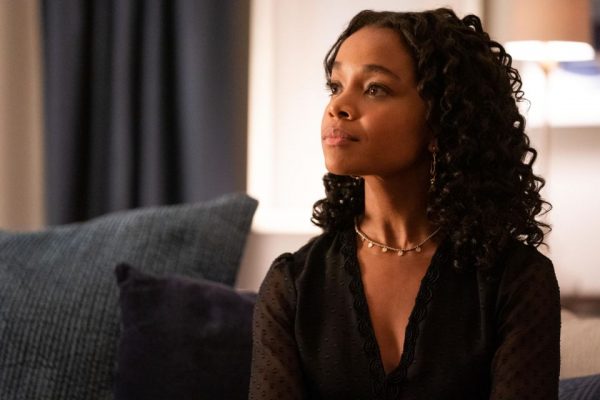Television Review: Hulu’s “Love, Victor” — Coming Out, Made Complicated
By Sarah Osman
It has its flaws, but Love, Victor is a fun teen rom-com that isn’t entirely rosy.

Michael Cimino is Victor, the heartthrob at the center of Love, Victor. Photo: Eric McCandless/Hulu.
Love, Simon, which was released in 2018, is a pleasant enough film. It centers around a gay teenager, Simon (Nick Robinson), as he begins an email relationship with another gay teenager at his school. It’s a sweet rom-com where everyone accepts him — including his super liberal parents (we are reminded of their enlightened political credentials at least eight times). When it was first released, Love, Simon was remarkable because it was the first mainstream studio film that revolved around a gay character and his own love story. While the movie was a success, it also faced a fair amount of skepticism because of Simon’s astronomical amount of white privilege. He does face some homophobia, but it’s quickly dealt with.
Love, Victor, Hulu’s spin-off series of Love, Simon, is not quite as rosy. To its credit, this version is somewhat more complex than its predecessor. On the surface, the show is a charming look at Victor (Michael Cimino), a Latino teenager who is new to town. The guy grapples with his sexual identity, his economic background, and what would happen if he comes out to his religious parents (who are having struggles of their own). Victor’s day-to-day life feels similar to the goings on in a fair amount of teen dramedies. In addition, Victor and company speak a vernacular that is far more sophisticated than the usual talk that comes out of the mouths of your average teenagers. They also drink coffee as though their lives depend on it. Where the show becomes intriguing is with Victor’s pen-pal relationship with Simon, the character from the film.
Throughout the series, Victor becomes increasingly angry with Simon. It’s almost as though he saw the original movie and is dead set on pointing out all that the reviewers found wrong. He goes to the same high school (Creekwood High) that Simon did, and has become familiar with Simon’s epic story. He finds Simon on Instagram and begins to write to him, starting off each message with “Dear Simon,” a nice nod to the original film. Once Victor begins to compare his own life to Simon’s, he quickly becomes angry, writing “Screw you!” He also reminds Simon that “he is very lucky.” Simon, on his part, always responds with polite, reassuring advice — that isn’t all that helpful for Victor. Unlike Simon’s, Victor’s story is not that easy.
It’s wise of the series to be far more than a rehash of Simon’s story. By acknowledging the flaws in Love, Simon, the story creates something new: a teen dramedy that can be seen as a form of TV criticism. That angle makes this coming-out-story a rarity; it also has the merit of featuring a troubled family that — although common in America — has only been glimpsed in a handful of TV shows before. Victor’s sexuality is also complex: he tries to date a girl, Mia (Rachel Naomi Hilson), while also crushing on his gay co-worker, Benji (George Sear).

Mia (Rachel Naomi Hilson) in Love, Victor. Photo: Eric McCandless/Hulu.
Still, for all its gumption, Love, Victor is a bit too tame at times. The show was originally designed to be on Disney Plus, but was moved to Hulu once corporate higher-ups deemed that it wasn’t family friendly enough. There are traces of Disney here: sometimes things are too easy for Victor — he quickly makes friends, joins the basketball team, and Benji is accepted by all of his classmates. In the original film, Simon and his classmate at least have a tussle with homophobic bullies. No bullies mar the cozy scene in Love, Victor. Wouldn’t it make sense that Victor would face some strife?
Still, despite these gripes, Love, Victor is a fun teen rom-com. It supplies a range of moments: sweet, funny, and heartwarming. If Love, Victor earns a second season, it will be interesting to see if the show dares to turn a bit darker. Or if it will show us Victor coming into his own. Until then, Love, Victor offers a mellow touch of rebellion: at least it pushes back against what has become a bland formula, rewriting the coming-out drama from the perspective of someone who doesn’t come from white privilege.
Sarah Mina Osman is a writer living in Los Angeles. She has written for Young Hollywood and High Voltage Magazine. She will be featured in the upcoming anthology Fury: Women’s Lived Experiences under the Trump Era.
